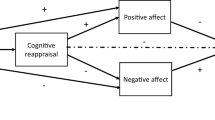Abstract
Mindfulness meditation leads to a range of positive outcomes, yet little is known about the motivation behind choosing to practice meditation. This research investigated reasons for commencing and continuing mindfulness meditation. In both qualitative and quantitative analyses, the most frequently cited reason for commencing and continuing meditation practice was to alleviate emotional distress and enhance emotion regulation. A substantial proportion of participants also reported continuing meditation to enhance well-being, though very few commenced or continued meditation practice for spiritual or religious reasons. In brief, the overwhelming majority of participants in the present study reported practicing mindfulness to alleviate emotional distress. Further research is needed to examine reasons for meditation across more diverse samples, and whether reasons for meditation differentially predict outcome.


Similar content being viewed by others
References
Baer, R. A. (2003). Mindfulness training as a clinical intervention: a conceptual and empirical review. Clin Psychol Sci Pract, 10(2), 125–43. doi:10.1093/clipsy.bpg015.
Braun, V., & Clarke, V. (2006). Using thematic analysis in psychology. Qual Res Psychol, 3, 77–101. doi:10.1191/1478088706qp063oa.
Braun, V., & Clarke, V. (2013). Successful Qualitative Research: A Practical Guide for Beginners. London: Sage.
Carmody, J., Baer, R. A., Lykins E., & Olendzki, N. (2009). An empirical study of the mechanisms of mindfulness in a mindfulness‐based stress reduction program. J Clin Psychol, 65, 613–26. doi:10.1002/jclp.20579.
Kabat-Zinn, J. (1990). Full catastrophe living: Using the wisdom of your body and mind to face stress, pain and illness. New York: Delacorte.
Kabat-Zinn, J. (1994). Wherever you go, there you are: Mindfulness meditation in everyday life. New York: Hyperion.
Keng, S.-L., Smoski, M. J., & Robins, C. J. (2011). Effects of mindfulness on psychological health: a review of empirical studies. Clin Psychol Rev, 31, 1041–56. doi:10.1016/j.cpr.2011.04.006.
Richards, L., & Morse, J. (2007). Readme First for a User’s Guide to Qualitative Methods (2nd ed.). Thousand Oaks Calif.: Sage Publications.
Shapiro, D. H. (1992). A preliminary study of long-term meditators: goals, effects, religious orientation, cognitions. J Transpers Psychol, 24, 23–39.
Shapiro, D. H. (1994). Examining the content and context of meditation: a challenge for psychology in the areas of stress management, psychotherapy, and religion/values. J Humanist Psychol, 34, 101–35. doi:10.1177/00221678940344008.
Author information
Authors and Affiliations
Corresponding author
Rights and permissions
About this article
Cite this article
Pepping, C.A., Walters, B., Davis, P.J. et al. Why Do People Practice Mindfulness? An Investigation into Reasons for Practicing Mindfulness Meditation. Mindfulness 7, 542–547 (2016). https://doi.org/10.1007/s12671-016-0490-3
Published:
Issue Date:
DOI: https://doi.org/10.1007/s12671-016-0490-3




